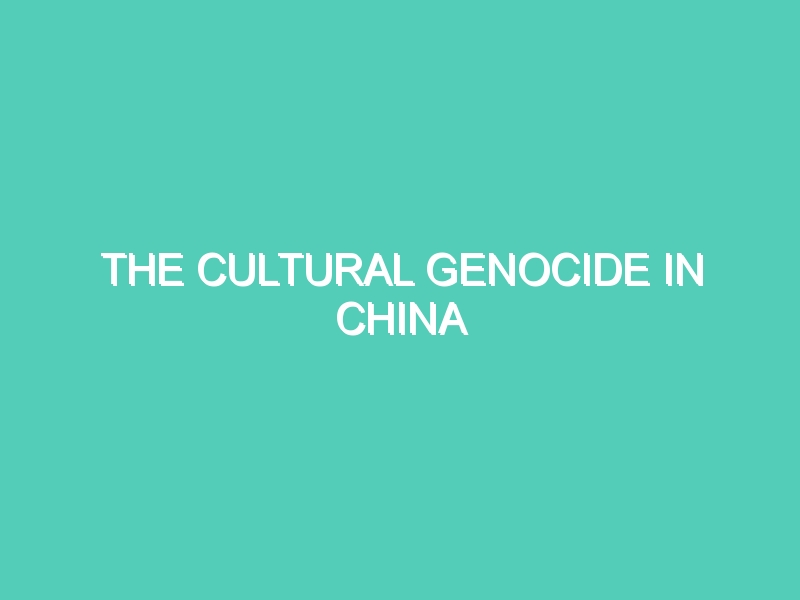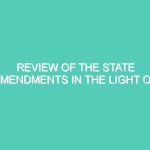China has always been wary of their religious traditions and identities prevailing in their nation, particularly Islam. It is the importance of culture which acts as the centre to a country, and for China it has been particularly the case so where it has excessively adhered to the principles, scrapping off rights of various communities living in the nation. Such taking away of rights, leaves the community in a total state of despair and their identity striped with no respite and poverty-stricken. Though, there are international level responses and condemnations regarding the same and who are determined to uplift the position of the minority communities and end the era of authoritarianism; this article aims to demonstrate the prevalent conditions of one of such minority groups namely the Uighur Muslims who have been under the scrutiny of mass religious persecution at the hands of the Hans Chinese and analyse the intervention by other human rights group and organizations resulting in a tussle with the Chinese Government.
The Uighur’s comprise of one of the many religious minorities existing in China where the majority of Hans Chinese prevails. Their population as per the 2010 Census displays a number of more than 10 million, constituting as less than one percent of the entire nation[1]. They have origins to eastern-Turkestan where the influence of faith clearly reflects on their language and culture. While they have been regarded to have influences from Turkey and allied areas, majorly of east-Turkestan, Islam revolves as one of their core elements of their self-identity. In China, they are mostly placed in the vast land of Xinjiang which operates as the major source for oil and gas and acts as one of the prime routes for trade between countries.Since the foundation of the People’s Republic of China in 1949 and the advent of the Russian imperialism, it led to a massive effect on the education system by shifting to secular schools involving a multi-cultural education rather than religious schools which focused on their own specific religions[2]. However, since the establishment of the Chinese Communist Party, through these methods, there was an unnecessary involvement in its citizen’s religion by the State, especially by the minority community and groups. Such imposition of policies led to a specific target on the Uighur Muslims community in China.
Surprisingly, the leaders of the parties in order to establish such dominance of the Hans Chinese across the nation, they tried to bridge the population in Xinjiang which was majorly held by the Uighur’s. They started with the migration of Hans Chinese to dilute the population and have an effective control over the area. Within the time frame from 1958 to 2008, the population of the Hans Chinese rose high at an effective rate making the Uighur population to less than 50%[3].Such dilution eventually led to a higher standard of living in the region of Xinjian where couple of Han Chinese were earning well and as per the 2000 Census data[4], the Hans Chinese were equipped with better jobs ranging from manufacturing, technology, sales etc. and a higher pay-scale which increase the overall lifestyle whereas the Uighur Muslims were subject to only areas of Agriculture with a much lower earning, thus marking the beginning of the discrimination and exclusion of the Uighur’s in China.Moreover, they were boycotted in the employment sector from any job position leading to the distribution of its benefits to everyone except the Uighur’s. The revenue generated from the natural resources such as oil, gas, fossil fuels, coal etc. led them to export a rough figure of $6.7 billion worth of goods in 2017[5]. Now, most of the revenue earned was going to the Han Chinese residing in Xinjian and thus, the cost of living exploded leading the Uighur’s with not much resources to acquire such products. Due to all the resources being directed to the Han population, the Uighur’s ultimately felt dispossessed and resulting in the increase in their level of poverty.[6]
Finally, amidst all this, in 2009 there was a backlash from the community where there was mass scale violence conducted as a reply to the oppressive government policies in Xinjian leading to atleast 200 deaths and over 1800 casualties[7]. This was one of the worst riots which took place in the history of the country in Urumqi.Furthermore, since then both the sides have not been resistant to attack each other at a national level. There were incidents where reportedly, the Uighur Muslims carried out the attacks leading to mass deaths, now classifying them as ‘terrorists’ by the government. However, one fails to understand that were all incited attacks due to the religious extremism and their curb on human rights, including their freedom to religion. Most recently, the attacks in 2017 by three knife wielding men killed eight people in the southern area of Xinjian, claimed to be an act committed by the Uighur’s on the Hans[8].Thus, it became more important for China as a nation to gain an effective control over the area of Xinjian.Thus, the Government in order to achieve this, claims any expression of Uighur activity in the domain of ‘three evils’, namely separatism, terrorism and religious extremism[9]. Furthermore, there have been an excess intervention by the authorities now into the religion of such Uighur’s where women from such community are banned from wearing the hijab[10], young men not allowed to grow long beards[11], parents to not send their children to any Uighur educational institutions, no pictures of any mosque in the homes of such people, Quran to be state- approved and as necessary to be altered[12], restriction of freedom of movement leading to prohibition of the Hajj pilgrimage[13] etc. Basically, any sort of expression which conveys their identities of being a Muslim is scrapped off and take away, violating the essence of the freedom to religion. The curb and regulation on the religion by the State is what to be condemned the most whereby inside the mosques, where no such picture of any idol should be placed, people used to see the images of Xi Jinping for the prayers, thereby promoting the typical communist propaganda.[14]
THE SECRET INTERNMENT CAMPS IN XINJIANG
In 2013, China enacted the new ‘Belt and Road Initiative’ programme as one of its biggest infrastructural projects in the history of the nation involving multi-trillion dollar of resources[15]. The aim was to increase the efficiency of trade for China with the rest of the world. The project expanded over the continents of Europe to East, Southeast, Central and South Asia to Middle East and North Africa with an aim to connect more than 65 countries in its project[16]. The Belt and Road Initiative was to be achieved via the creation of a vast network of optic fibres, railways and other modes of transportation, gas, and energy pipelines to boost the economic and political influence around the world. Sources have revealed that a majority of such projects are to be initiated via the regions of Xinjiang[17], thus making it even more essential for the authorities to have secure grip and control over the nation. In order to achieve this, the State started to intervene the personal lives of the people in Xinjiang, majorly the population of the Uighur Muslims. The Uighur’s became a major threat in terms of extremist and a separatist threat to the Chinese authorities. The State turned Xinjiang to a highly police-state where there was various invasion to these minorities’ privacy. Incidents such as having thousands of cameras in public places with facial recognition technology, vehicles were tracked for any suspicious activities, mandatory mobile apps which scan the Uighur devices for incorrect content present on such devices, submitting their DNA Samples, biometric data to gain insights on their lifestyle etc[18]. Basically, the lives of the minorities were no more personal and there was public intervention with relation to each and every activity so as to deem them as ‘unsafe’.Monitoring of people’s identities and suspicious activities were prevalent across all parts of the country, however in Xinjiang the magnitude of the surveillance was highly increased.
The authorities from carrying out the above practices of surveillance, categorize the Uighurs as ‘safe’ and ‘unsafe’[19]. The people who are found guilty or violate these practises, are said to be ‘unsafe’ and send them to secret internment camps which the State calls it as ‘vocational education centres’.Moreover, the United Nations in 2018 had received reports on the new Chinese policies for the establishment of ‘massive internment camps’ with watch towers which are ‘shrouded in secrecy’[20]. The Chines officials have recognized the existence of such centres to eliminate the extremism which pose as a ‘threat’ to their nation. They imprison the Uighurs because of their extremist behaviour which they categorize it as ‘terrorism’ as per the violations of the activities mentioned above. As per various sources and reports, more than a million of Uighur Muslims have been now arbitrarily detained[21]. There are hundreds of camps located in Xinjiang since the Communist Party came into ruling. Moreover, what’s interesting is the fact that many of the detention camps are now being expanded in a short time at thrice the rate. Several detainees upon their statements from these camps have provided an insight with the activities operating within such camps. There are incidents of repeated promotion of the communist propaganda and learn to critique or go against their own religion. Instances of sexual abuse and physical beat up were common in these camps which have led to deaths of many detainees. The result of this destruction of the Uighur minority culture among the majority Han Chinese has led China to implement a cultural genocide, a one which was last done by the famous Nazi Germany towards the Jews.
GLOBAL RESPONSE
Many international organizations, Human Rights centres are trying to decrease the level of such genocide, however the State has very explicitly and vehemently denied any access to any outside investigators to have a look of these camps, categorizing it as an ‘internal issue’[22]. The United Nations and the European Union have repeatedly pressurized the Chinese authorities to respect the religious freedom as a basic human right acceptable globally and reform its practices and the marginalization which the State is doing on the Uighur’s livelihood. There have been condemnations by various countries of this behaviour being exhibited on the Uighurs. They have shown such concerns to the UN human rights chief by countries (majority of them being European countries)[23]regarding such actions and as an appeal to intervene to settle such inhumane behaviour, however most surprisingly, there was no Muslim majority countries who came out in support of these concerns[24]. Rather these countries appreciated such policies acting as a defence to China in relation to these counter-extremists policies carried out in Xinjiang. Major Islamic countries have not even released their public statements nor have contributed in any way to reduce the despair faced by their community members. It was only Turkey who voiced its concerns over this issue to ensure “full protection of the cultural identities of the Uighurs and other Muslims”[25]. The reason of the no-support by majority of the Muslim dominated countries is due to the preservation of the ties with China after the introduction of the Belt and Road Initiative. China accounts for 26% approx. of the Saudi Arabia’s oil exports and roughly one third of Iran’s[26]. It has also ensured adequate infrastructure development in the China-Pakistan Economic Corridor by providing the necessary resources to the countries financially.
China through its massive multi-dollar program to facilitate trade with these countries and playing a major role of supplier, have tend to ‘buy the silence of such nations’ to help them overlook such behaviour which has been going on their fellow community members[27]. The economic ties with China as the prominent trade member with such countries have led the countries to maintain a positive relationship with them. Another reason could be to avoid the attraction to its own country’s situation, in relation to the treatment of the religious minorities and other communities which have been deprived of the human rights. It’s a well known fact how countries like Pakistan and Saudi Arabia have records of the religious persecution prevailing in their country with respect to Ahmadiyya Muslims and other religious communities, thus it would be hard to expect the same reaction towards other countries in supportof their religion.
CONCLUSION
The modern age conditions with relation to these communities have further declined in respect to Uighurs. Even after much deliberation and pressurization by the organizations and countries at the international level, less has been done to turn the tables in favour of them and provide them with their rights to practice any religion of their choice. The Chinese government by implementing various surveillance mechanisms and invasions of privacy, has declined, or neglected such rights. Moreover, detaining them into camps to ‘re-educate’ them has further led to inflict violence and being a classic example of cultural genocide. The countries who depend on China for its trade and supplies, they should rise to oppose the authoritarian system prevailing in Chinarather than ignoring such issues at the cost of their economic and political ties, they should promote the human rights along with other international agencies and organizations which have been grossly violated.
Article Written By-Kushal Tekriwal
(HRDI Work From Home Internship)
[1] Ciara Finnegan, “The Uighur Minority in China: A Case Study of Cultural Geocide, Minority Rights, and the Insufficiency of the International Legal Framework in Preventing State-Imposed Extinction” 9 Law1 -20 (January 11, 2020).
[2]Ibid.
[3]“The ‘ethnic cleansing’ of Myanmar’s Rohingya Muslims, explained” Vox (September, 25, 2017), Accessed from <https://www.youtube.com/watch?v=cMkHcZ5IwjU>.
[4]Supra note 2.
[5]“China’s war on Uighur identity, explained” Al Jazeera English (October 25, 2018), Accessed from <https://www.youtube.com/watch?v=Oc5vVat5iuc>.
[6] Sutirtho Patranobis, “Muslims, Tibetans among the most poor in China, says govt report” Hindustan Times, December 24, 2019.
[7] Dilmurat Mahmut, “Controlling Religious Knowledge and Education for Countering Religious Extremism: Case Study of the Uyghur Muslims in China” 5 Forum of International Research in Education22-43 (2019).
[8]“China mass stabbing: Deadly knife attack in Kunming” BBC News, March 2, 2014.
[9]Supra note 6.
[10]“China Uighurs: Ban on long beards, veils in Xinjiang” Al Jazeera April 1, 2017.
[11]Ibid.
[12]Farid Hafez, “China’s attempt to change the Quran” Daily Sabah, January 9, 2020.
[13]Supra note 6.
[14]Supra note 6.
[15]“China’s Massive Belt and Road Initiative” Council on Foreign Relations, January 28, 2020.
[16]Fung Business Intelligence Centre “The Belt and Road Initiative: 65 Countries and Beyond” 1-9 (May, 2016).
[17]Supra note 16.
[18]Supra note 6.
[19]Supra note 6.
[20]Stephanie Nebehay, “U.N. says it has credible reports that China holds million Uighurs in secret camps” Reuters, August 10, 2018.
[21]“China’s Repression of Uighurs in Xinjiang” Council on Foreign Relations, June 30, 2020.
[22]Ibid.
[23]Catherine Putz“Which Countries Are For or Against China’s Xinjiang Policies?” The Diplomat, July 15, 2019.
[25] “Turkey condemns China’s abuse of Uighur Muslims” U.S> Embassy and Consulates in Turkey, February 16, 2019.
[26]“China oil imports in Jan-Feb from Saudi Arabia rise 26 per cent from year ago” The Economic Times, March 25, 2020.
[27]Supra note 6.



